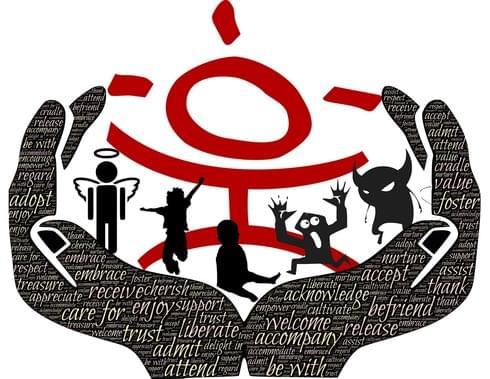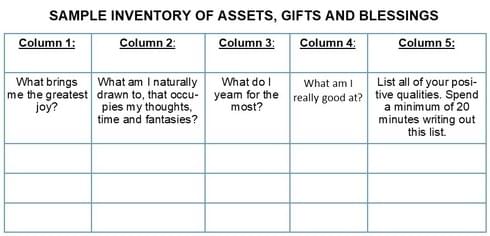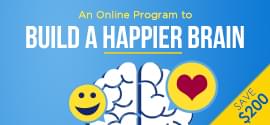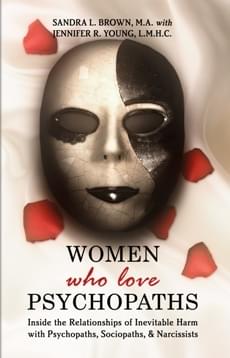Survive, Transform, Soar! – Issue #93
Do I Really Have To Look At Me?
Step 4: ‘The 12 Steps’ Of Spiritual Recovery, Part 4
Article by: Rivka A. Edery, MSW, LCSW in SurviveTransformSoar.com | Friday, December 21, 2018
This week we conclude our work with Step 4 of The Twelve Steps of AA, which I recommend as a healing tool in toxic relationship recovery.
Step 4 is to make a searching and fearless moral inventory of ourselves. (If you are a new subscriber, see the end of this essay for links to the previous articles.)
Writing an inventory would have seemed less threatening to me without the word moral, implying that I was looking for everything that is wrong with me. I thought this step was about harsh judgment. Upon further reflection, however, the words that most resonate with me for “moral” are clean and ethical.
Look with the Lens of Compassion
This step calls for self-love and an honoring of your hurts (origin of resentment). It is also a chance to come clean about your role in the conflicts that may have caused some of your resentments. When you come clean about your part, if you had any role in your resentments, you may have a shift in perspective. What you decide to do with this new shift will be determined as you work through the rest of the Twelve Steps.
The exploration in Step Four is a delicate process. Destructive, or otherwise painful behavioral patterns, are usually rooted in unresolved pain and misunderstanding. Without the lens of compassion, you can stop this process from being a relief to you or you can cause further harm.

Self-compassion will allow you to look deep and ultimately accept your whole self
Alternatively, looking deeper into yourself to find the source of your patterns can lead to healthier ways of expressing feelings, wants and needs. The morality of this process (clean, honest, good and ethical) is the linchpin of writing a successful inventory.
I cannot stress enough the importance of being compassionate toward yourself when writing your inventory. For this process to be effective, you must be willing to admit what coping mechanisms are no longer working in your life. Analyzing your patterns and evaluating what behaviors, attitudes and thoughts you would like to stop will significantly change the way you operate in the world and allow you to have loving connections with yourself and others.
Acknowledging Past Coping Methods Enables More Choices
The key is to have a balanced and compassionate perspective. This is not about self-blame, but it is about taking healthy, appropriate responsibility where needed. It can seem terrifying to think of the traumatic experiences you survived and how they affected your life. Admitting responsibility for forming coping mechanisms can seem like a forced confession and this guilt can hinder you from healing your shame.
In my case, I affirmed that I did the best I could, considering what I had to work with, and I was now perfectly capable to make different choices. This did not mean that I no longer carried the scars of painful events, but rather, I was becoming more responsible for my life in the present.
This was a turning point in my journey. It is not healthy to see yourself only as a victim, yet you still need to acknowledge the effects that traumatic events had on your life, your psyche, your personality and your well-being.
Without the honest expression that Step Four calls for, the rest of the Twelve Steps will be inadequate because you will continue to repress the real underlying issues. This kind of fearless inventory allows you to pick up the most difficult feelings that can arise from a “fearless, moral inventory,” get to know it and face it head-on.
Growing Awareness = Peace and Prevention
The benefits of this emotional effort include increased inner peace, preventing re-victimization and awareness of why you are miserable (as you have previously self-identified in Step One). It also illuminates the direction for your solutions.
The most significant moment in each step is when you wake up. At a certain moment, you become conscious of your imprisoned state and you decide how you are going to orchestrate your escape. You begin by letting go of your story of self-blame.
This is followed by becoming increasingly conscious and aware, a process many survivors naturally fight against because it awakens misery and entrapment. But the payoff is that you also become aware of your options, which are hopefully based on your True Self.

Your defenses were crutches you needed to heal, but now you can be free of them.
CONSCIOUSNESS RAISING – THIRTEEN QUESTIONS
To discover whether you need to deal with your traumatic past, and whether the Fourth Step Inventory can help you in your growth process, answer the following thirteen questions.
1) Do you question the meaning of life, because of what you survived? Describe.
2) Do you want to clearly understand the meanings and origins of your trauma-reactive habits, irrational behaviors, attitudes and symptoms? (enabling relief from painful symptoms such as anxiety, depression and blocks to valuable change).
3) Are you an adult victim of child abuse where your internal “emotional circuits” were weakened or damaged by chronically inflamed fear and rage? If yes, do you feel emotionally overwhelmed at times and utilize your character defects to cope?
4) Do you forget things automatically (unconsciously) when you feel threatened, specifically when the intensity of your guilt, fear, depression or anxiety gets too great for you? (This is an unconscious defense).
5) Are you living in a family or working in a job that takes up all your energy, but you don’t experience it as giving back what you need?
6) Do you feel an internal pressure to please others and does this “people pleasing” hold you from growing? (Do you passively let other people make your decisions?)
7) Do you let other people take credit for what you have done? If yes, why do you allow for that?
8) Does it seem impossible to be rid of the excessive guilt and shame you carry?
9) Do you wish you could avoid destructive relationships but act on your compulsion to keep repeating the same destructive pattern repeatedly?
10) What are your personal methods of keeping yourself from experiencing your emotions? Are your methods maladaptive?
11) Do you want to trade this in for a more healthy and loving way of relating to yourself and others?
12) Do you try too hard, or not enough, to connect with others? If yes, how does this make you feel and view other people?
13) Do you feel the desire to be restored to spiritual integrity? If yes, what is motivating you?

Spending time in your Garden of Eden reminds you how it feels to feel good and helps you get unstuck.
It is imperative that you look at your gifts, skills, assets and positive contributions. This is all part of becoming aware of what has had a positive impact on your life and the lives of others. Step Four is about having an accurate picture of yourself and this includes the character traits and behaviors you want more of.
‘Remember’ How It Feels to Feel Good
A close friend of mine, Susan Price, L.M.S.W., refers to this as the Garden of Eden Theory. She explains that a stuck person needs to visit the Garden of Eden to find out what it feels like to feel good.
Once you visit those parts of yourself that are healthy and partake of pleasure in your divinely ordained attributes, you realize what is not working and what is working in your life. With this combination of hope and discomfort in what you see in yourself, you create a climate for appropriate change, which brings about an increase in self-awareness.
This is not to be confused with self-absorption, narcissism or self-centeredness. The difference is in the process of consciousness raising, an attitude of love and tolerance, using self-knowledge to take the next right action, and regular spiritual practice and growth.
“My Creator, I invite you in to help me uncover, discover, and recover my personal assets and gifts. I ask for your help in approaching my blessings with courage, humility, strength, integrity and joy so I can utilize them in the service of humanity. Help me accept them and grant me strength to help make this world a better place in partnership with you. I no longer want to remain trapped, hiding my blessings. Please help me have a more accurate view of myself and to awaken to the Real Me, as you originally created me. I ask for your Presence so I will not shy away from, or be overwhelmed by, this process. Amen.”

Please be patient with your process of awakening. Remember that a rising consciousness takes time and patience. Your new-found self-respect and self-acceptance will help you spring out of your personal traps, enabling increased capacity to utilize your blessings and gifts for transformation.
This is possible regardless of what was done to you or what you have personally suffered. This is the essence of emotional liberation, a painstaking process requiring patience, love, prayer and compassion.
“And you? When will you begin that long journey into yourself?” ~ Rumi
Previous “Survive, Transform, Soar!” articles by Rivka Edery, MSW, LCSW
Step 1 – Can The 12 Steps Help You Recover from a Toxic Partner?, Dec. 1, 2017
Step 2 and 3 – Addiction, Spirituality and Toxic Relationships, Feb. 23, 2018
Step 4, Part 1 – What Is The Key To Your Future?, June 8, 2018
Step 4, Part 2 – How To Face The Truth To Heal For Good, September 14, 2018
Step 4, Part 3 – How To Make Your Pain A Tool For Change, December 14, 2018
For each week’s complete issue delivered to your inbox, please subscribe here to Survive, Transform, Soar! or check out a sample issue.





